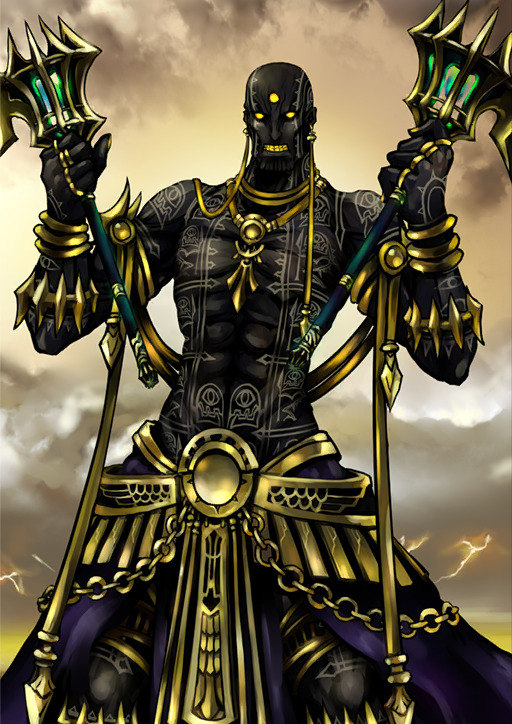#darius iii
Text
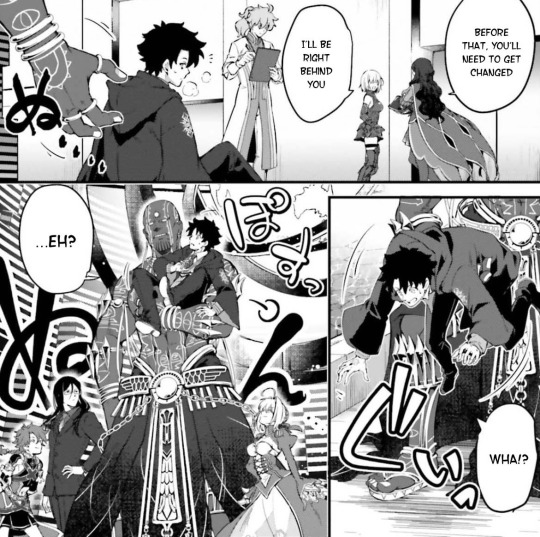

#fate grand order#fate grand order - the heroic spirit food chronicles#fate grand order eirei shokubunroku#darius iii#gudao#fujimaru ritsuka#mangacap
319 notes
·
View notes
Note
Hi. Do you know what happened to Darius's son? Thank you.
We don't. We're not even 100% sure he had one. The boy appears almost exclusively in Curtius,* the narrative of Darius' family before Alexander. He's portrayed there to contrast his father: see, the son--a little boy--is braver! It also showcases Alexander's kindness and clemency, as he picks him up, doesn't kill him in front of his mother.
But Ochus (the boy) disappears from the narrative after this. This presents three possibilities:
Alexander had him killed at some point after, because he could become a rallying point for rebel Persians. Or Alexander feared he might rebel himself when he grew up.
Alexander had him spirited away and put in hiding to keep him away from rebel Persians who might use him as a figurehead.
There was no son.
I'm going with door #1 or #3, probably #3. While it's not necessary that Bessus would claim the upright tiara in the name of Darius's son, the fact he claims it for himself might be suggestive. The reason I don't think it's #2: it's simply too dangerous for Alexander to let him live...although he does let Darius's brother live, so....
Nonetheless, I just think it's just meant to be a contrasting example to Darius. The Greeks didn't understand ANE omens of king-death on the battlefield, so they simply regarded Darius's retreat as cowardice.
-------
*The only other mention is the Fragmentum Sabbaiticum, which might be contemporaneous with Arrian. Stress on "might."
#asks#Darius III#Alexander the Great#Persian family of Darius#ancient Persia#ancient Macedonia#Alexander the Great's conquests#Classics
14 notes
·
View notes
Text
I've just watched the first episode of the new Alexander documentary on Netflix. And, apart from some huge historical inaccuracies, I enjoyed it. They finally gave us Alexander and Hephaistion

Now show Darius loving men too!
It's not just the white, blue-eyed, blond, progressive European guy who had sex with men while conquering the world.
The middle eastern guy did too! Both reign the largest empire known to men back then, and having sex with them as well.
8 notes
·
View notes
Text
Netflix not mentioning the fact that Darius was married to his sister Stateira. Like, not only they ignore this, they go to say that Darius married her for her blood to have the support of the nobles. They have the same blood!!
9 notes
·
View notes
Text
In the realm of ancient political power struggles, treachery and assassinations were a common occurrence. Rivalries were settled through poison, betrayal and violence, determining the fate of both powerful figures and their nations.
#Assassination#Murder#betrayal#Julius Caesar#killers#Pompey#Darius III#Caligula#Philip II#Commodus#Achaemenid#ancient#history#ancient origins
20 notes
·
View notes
Text
Fate Grand Order Servant Comparisons
Darius III
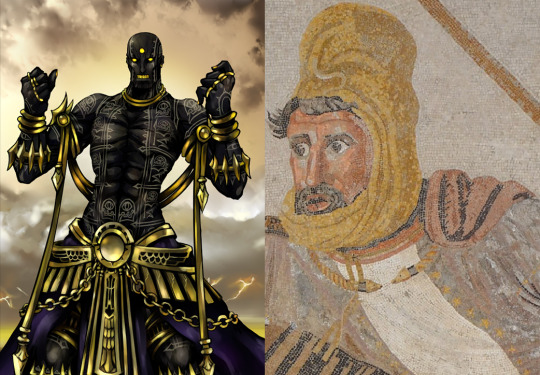
Left - FGO
Right - Alexander Mosaic (c. 100 BC)
#fate grand order#fgo#darius iii#darius iii fgo#fgo darius iii#darius iii fate#fate darius iii#darius#darius fgo#fgo darius#darius fate#fate darius
8 notes
·
View notes
Text
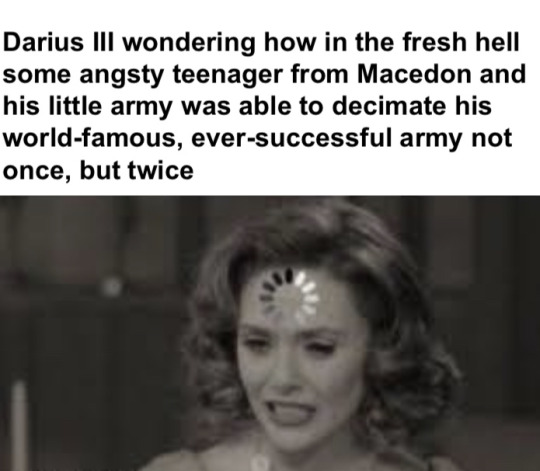
And then getting disowned by his mom, and then being chased around all over his former kingdom, and then getting killed by Bessus, and then…
#historical memes#history#history memes#meme#memes#ancient history#historical#Persia#persian empire#achaemenid#Achaemenid empire#Darius#Darius iii#alexander of macedon#alexander the great#macedon
119 notes
·
View notes
Text

Context:



10 notes
·
View notes
Text
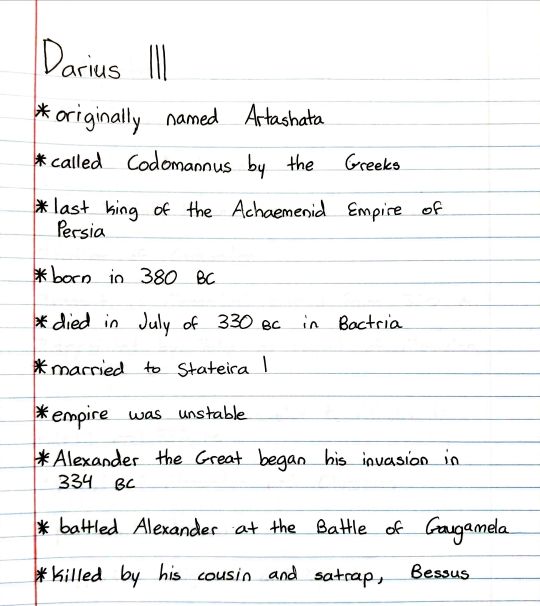
Patreon
#studyblr#notes#history#historyblr#world history#western civ#western civilization#greek history#alexander the great#codomannus#darius III#artashata#persia#persian history#battle of gaugamela#bessus#darius of persia#bactria#ancient history#ancient greece#ancient persia
2 notes
·
View notes
Text

#wolfgang amadeus mozart#waver velvet#cu chulainn caster#sasaki kojiro#hassan of the cursed arm#stheno#jing ke#charles henri sanson#phantom of the opera#mata hari#carmilla#heracles#lancelot#lu bu#spartacus#sakata kintoki#vlad iii#asterios#darius iii#caligula#kiyohime#eric bloodaxe#tamamo cat#jeanne d'arc#orion#elizabeth bathory#tamamo no mae#david#hector#francis drake
21 notes
·
View notes
Text



#fate grand order#fate grand order eirei shokubunroku#fate grand order the heroic spirit food chronicles#nero claudius#nero claudius caesar augustus germanicus#mash kyrielight#waver velvet#iskandar#darius iii#mangacap
53 notes
·
View notes
Text






The Owl House | Darius & Eberwolf | Icons
please like/reblog if you use/save
#toh#the owl house#darius#darius deamonne#eberwolf#eberwolf the huntsman#icons#toh icons#darius iii#eberwolf icons#my icons
41 notes
·
View notes
Text


ON the Right we have the Viking King, Ragnar Lodbrok
ON the Left we have Darius III enemy of Iskander, and Ruler of the Persian empire
11 notes
·
View notes
Text

2 notes
·
View notes
Photo
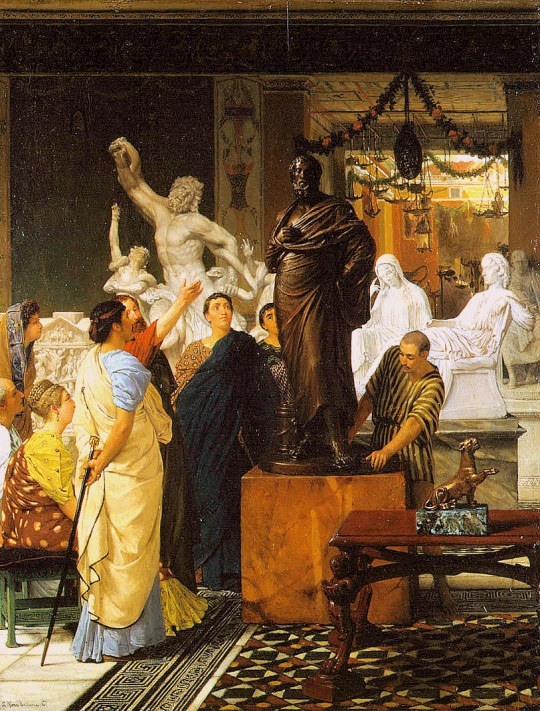

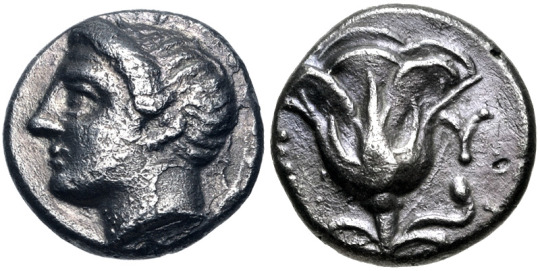
A Sculpture Gallery in Rome at the Time of Agrippa by Lawrence Alma-Tadema + Memnon of Rhodes by Dalton Thomas Rix + Coinage of Memnon of Rhodes, Mysia. Mid 4th century BC
Memnon's career in Persian service had a strange start. In fact, the Persians needed his brother Mentor to defend the Troad (the northwest of modern Turkey), and gave him land in that region. Not much later, Mentor was made Persian supreme commander in the West and married Barsine, the daughter of the satrap of Hellespontine Phrygia, Artabazus, who married a sister of the Rhodians.
Memnon joined his brother and shared in his adventures. For example, when Artabazus rebelled against king Artaxerxes III Ochus in 353 or 352, they assisted him. The revolt was not successful, and Artabazus and Memnon were forced to flee to Pella, the capital of Macedonia. Here, they met king Philip, the young crown prince and the philosopher Aristotle of Stagira.
...
The Persians dug themselves in on the banks of the river Granicus, the modern Biga Çay. If Alexander moved to the south, where he wanted to liberate Greek towns like Ephesus and Miletus, they could attack his rear; if he moved to the east to drive them out, their position was strong enough to withstand the attack of a larger army. However, the Persians were defeated (June 334).
Darius, however, understood that Memnon had been right about his strategy. He ordered the Persian navy to move to the Aegean sea; it had to come from Egypt, Phoenicia, and Cyprus, and it arrived three days too late to prevent the capture of Miletus. However, Memnon, now appointed supreme commander, managed to keep the Persian naval base Halicarnassus (modern Bodrum) for a long time and was able to evacuate the town without unacceptable losses. In fact, Halicarnassus was the last Persian victory: after the siege, Alexander needed reinforcements, and it gave the Persians the opportunity to regroup.
—Memnon of Rhodes at Livius.org
Memnon, one of King Darius’s generals against Alexander, when a mercenary soldier excessively and impudently reviled Alexander, struck him with his spear, adding, I pay you to fight against Alexander, not to reproach him.
—Plutarch, Morals vol. 1
#Memnon of Rhodes#Dalton Thomas Rix#Lawrence Alma-Tadema#King Philip II of Macedon#Darius III#Aristotle#Laocoön#Alexander the Great#Plato
2 notes
·
View notes
